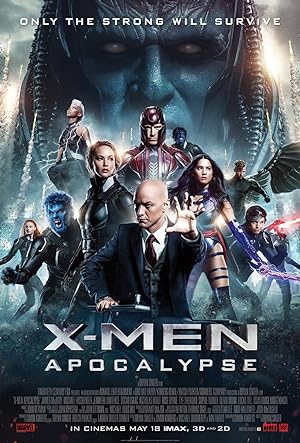X-Men: Apocalypse is supposed to be a summer blockbuster movie, but it fizzled out like flat soda when it hit the theaters. I’m a completist so I watched X-Men: Apocalypse with a trusty bucket of butter popcorn, but it felt like it would never end literally. X-Men: Apocalypse is 2 hours and 24 minutes long and about whether or not the mutants will join or fight the latest big bad, one of the firstancient mutants ever called Apocalypse, who looks like he is forming an eighties cover band inspired by Prince and the Revolution. So much purple! You know that a villain is not that great if you keep thinking that Agents of SHIELD Season 3 did it better with a lower budget and on TV. Sorry, X-Men: Apocalypse, I immediately went home and watched the Season 3 season finale of Agents of SHIELD to remember what awesome looked like.
Can we please stop making X-Men movies? It is hurting my soul how inconsistent each installment of the franchise is. If you sat down and watched every X-Men movie in chronological order, you would leave angrier and more confused. Also the franchise is painfully repetitive and unlike Marvel, it is not progressing in character and plot development, but regressing as it explores well-worn themes, but with less freshness and innovation in each chapter. Why do people keep rebuilding Cerebro? Stop kidnapping Prof. Xavier or at least do a better job protecting him. Will Magneto lose his crap and destroy the world? Rinse, condition, repeat. Even Bryan Singer can’t reinvigorate the franchise that he started.
I did enjoy some elements of X-Men: Apocalypse. First, James McAvoy and Michael Fassbender are still hot. I watch a lot of crap movies because McAvoy is in it. His enthusiasm and skill cover up a lot of inadequate scripts. Second, I was delighted that X-Men: Apocalypse set the most egregious mutant persecution and exploitation in sites of former Nazi strongholds. Third, I need these movies to just focus on Magneto’s kids instead of using them to solely advance Magneto’s plot. Quicksilver is still the most enjoyable and exciting character in X-Men: Apocalypse. I need more evil Snow White powers, but no, let’s cut what could have been an interesting development. Fourth, I liked the connection to Project X. Fifth, I like McAvoy’s whisper of resistance, “Those with the greatest power… protect those without. That’s my message to the world.”
Unfortunately X-Men: Apocalypse fell short more often than not. Remember all the press about Olivia Munn appearing in X-Men: Apocalypse. I think that I have more lines in X-Men: Apocalypse, but at least I didn’t have to wear a bathing suit and glower. Where is my press junket? I love Jennifer Lawrence, but if she is supposed to be the wise one with experience, she should not look like the kids’ contemporaries. Also Rebecca Romjin Stamos always played Mystique like Loki. Mystique enjoyed messing things up and was a little evil. She is an angry army of one, and I dug her for it even when I rooted against her. Lawrence plays her straight, and all the blue felt flat in comparison. You can say the same thing about Sansa as Jean Grey. She plays her more like a majestic angel than a blazing meteor threatening to destroy everything in her wake. Where is the kid that played a young Jean in X-Men: The Last Stand? She was scary!
Ultimately X-Men: Apocalypse fails because the stakes are too high. If Apocalypse’s plan works, wouldn’t everyone, humans and mutants, die? Also dear Apocalypse, I can’t believe that you found such ride and die mutant henchmen before. Twentieth century mutants are all about their own agenda, not yours.
X-Men: Apocalypse is more meh than amazing, and only franchise completists should bother to check it out. Newbies should just stick to Marvel.
Stay In The Know
Join my mailing list to get updates about recent reviews, upcoming speaking engagements, and film news.





